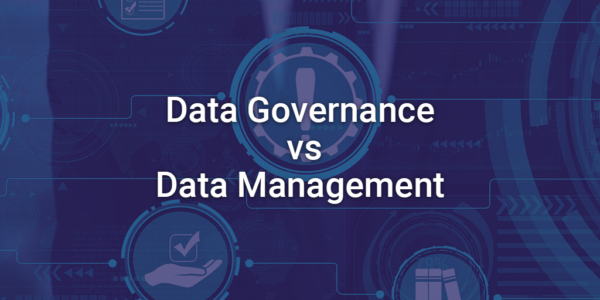Data Management vs Data Governance: What’s the difference?
Data governance and data management are two critical components of an organization’s data strategy. While these terms are often used interchangeably, it’s crucial to understand that they serve distinct but interconnected purposes. To understand the distinct nuances of data management and data governance, deciphering their respective roles and how they collaborate is key to unleashing the full potential of an organization’s data assets.
Difference in Definition
Data Management: This encompasses the logistics and methods of the entire data lifecycle and helps to define the processes, practices, and technologies used to acquire and organize the information. Data management is more operationally oriented, dealing with the day-to-day handling of data. This has become essential for business as they continue to generate mass amounts of data. One of the benefits of upkeeping this practice is reducing the siloed systems and allowing a better flow of information across your organization.
Data Governance: This refers to the availability, usability, and security of the data within an organization. Data governance focuses on defining policies and procedures to ensure that data is properly managed and aligned with business goals. Data governance helps to define access or ownership, compliance, and privacy.
Difference in Scope
Data Management: It involves the tactical aspects of handling data. This includes activities such as data integration, data storage, data retrieval, data processing, and data analysis. Data management is more focused on the execution of tasks related to the use and maintenance of data.
Data Governance: It is concerned with the strategic and policy aspects of data. It addresses issues such as data quality, data ownership, data stewardship, and compliance with regulations. Data governance ensures that there is a framework in place to guide the organization in using data effectively and responsibly.
Difference in Lifecycle
Data Management: This encompasses the entire data lifecycle, from creation and acquisition to archival or deletion. It involves various processes and activities to ensure that data is effectively and responsibly handled throughout its journey. Effective management at each phase is crucial for maintaining data quality, security, and compliance while extracting maximum value from the data.
Data Governance: An ongoing and continuous process that evolves as the organization’s needs and environment change. The data governance lifecycle is not strictly linear; organizations will revisit and iterate through refining and improving their data governance processes. The goal is to create a dynamic and responsive data governance framework that aligns with the evolving needs and challenges of the organization.
Difference in Responsibility
Data Management: This practice is primarily the responsibility of on organizations IT department to implement and continuously supervise the structure of a data system. Organizations with small or no IT departments may also choose to outsource this process. This is typically a recommendation for companies who hope to implement their data management system quickly or who have complex data or needs.
Data Governance: Responsibility for data governance typically extends across various roles within an organization. The specific roles and their responsibilities may vary depending on the organization’s structure, size, and industry. Many times, an executive or department leader could appoint a team or committee to implement governance policies. While specific roles may differ, a successful data governance program requires collaboration across business and IT functions.
In practice, data management and data governance are not mutually exclusive; rather, they are symbiotic. Effective data management relies on the strategic guidance provided by data governance, ensuring that operational activities align with overarching business objectives and compliance requirements.
While data management focuses on the tactical implementation of those guidelines, data governance sets the strategic guidelines and rules for data handling. Both are essential for an organization to make informed decisions, maintain data quality, ensure data security, and comply with regulations. By combining effective data governance and data management, organizations can leverage their data as an asset, supporting their business goals and objectives.

